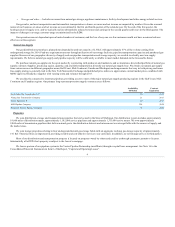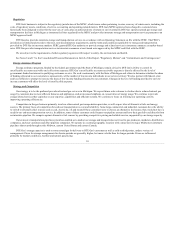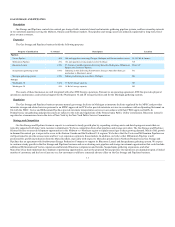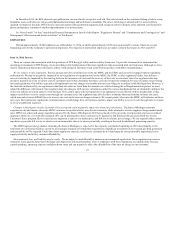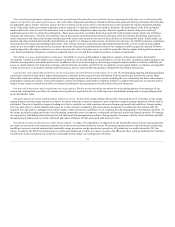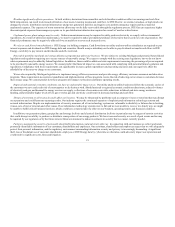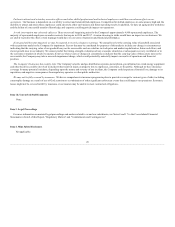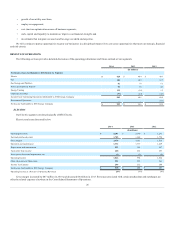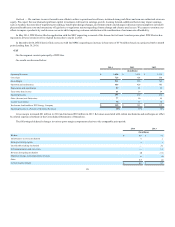DTE Energy 2014 Annual Report Download - page 21
Download and view the complete annual report
Please find page 21 of the 2014 DTE Energy annual report below. You can navigate through the pages in the report by either clicking on the pages listed below, or by using the keyword search tool below to find specific information within the annual report.
Weather significantly affects operations. At both utilities, deviations from normal hot and cold weather conditions affect our earnings and cash flow.
Mild temperatures can result in decreased utilization of our assets, lowering income and cash flow. At DTE Electric, ice storms, tornadoes, or high winds can
damage the electric distribution system infrastructure and power generation facilities and require us to perform emergency repairs and incur material
unplanned expenses. The expenses of storm restoration efforts may not be fully recoverable through the regulatory process. DTE Gas can experience higher
than anticipated expenses from emergency repairs on its gas distribution infrastructure required as a result of weather related issues.
Unplanned power plant outages may be costly. Unforeseen maintenance may be required to safely produce electricity or comply with environmental
regulations. As a result of unforeseen maintenance, we may be required to make spot market purchases of electricity that exceed our costs of generation. Our
financial performance may be negatively affected if we are unable to recover such increased costs.
We rely on cash flows from subsidiaries. DTE Energy is a holding company. Cash flows from our utility and non-utility subsidiaries are required to pay
interest expenses and dividends on DTE Energy debt and securities. Should a major subsidiary not be able to pay dividends or transfer cash flows to DTE
Energy, our ability to pay interest and dividends would be restricted.
Renewable portfolio standards and energy efficiency programs may affect our business. We are subject to existing Michigan and potential future federal
legislation and regulation requiring us to secure sources of renewable energy. We expect to comply with the existing state legislation, but we do not know
what requirements may be added by federal legislation. In addition, there could be additional state requirements increasing the percentage of power required
to be provided by renewable energy sources. We cannot predict the financial impact or costs associated with complying with potential future legislation and
regulations. Compliance with these requirements can significantly increase capital expenditures and operating expenses and can negatively affect the
affordability of the rates we charge to our customers.
We are also required by Michigan legislation to implement energy efficiency measures and provide energy efficiency customer awareness and education
programs. These requirements necessitate expenditures and implementation of these programs creates the risk of reducing our revenues as customers decrease
their energy usage. We cannot predict how these programs will impact our business and future operating results.
Regional and national economic conditions can have an unfavorable impact on us. Our utility and non-utility businesses follow the economic cycles of
the customers we serve and credit risk of counterparties we do business with. Should national or regional economic conditions deteriorate, reduced volumes
of electricity and gas, and demand for energy services we supply, collections of accounts receivable, reductions in federal and state energy assistance
funding, and potentially higher levels of lost gas or stolen gas and electricity could result in decreased earnings and cash flow.
Threats of terrorism or cyber-attacks could affect our business. We may be threatened by problems such as computer viruses or terrorism that may disrupt
our operations and could harm our operating results. Our industry requires the continued operation of sophisticated information technology systems and
network infrastructure. Despite our implementation of security measures, all of our technology systems are vulnerable to disability or failures due to hacking,
viruses, acts of war or terrorism and other causes. If our information technology systems were to fail and we were unable to recover in a timely way, we might
be unable to fulfill critical business functions, which could have a material adverse effect on our business, operating results, and financial condition.
In addition, our generation plants, gas pipeline and storage facilities and electrical distribution facilities in particular may be targets of terrorist activities
that could disrupt our ability to produce or distribute some portion of our energy products. We have increased security as a result of past events and we may
be required by our regulators or by the future terrorist threat environment to make investments in security that we cannot currently predict.
Failure to maintain the security of personally identifiable information could adversely affect us. In connection with our business we collect and retain
personally identifiable information of our customers, shareholders and employees. Our customers, shareholders and employees expect that we will adequately
protect their personal information, and the regulatory environment surrounding information security and privacy is increasingly demanding. A significant
theft, loss or fraudulent use of customer, shareholder, employee or DTE Energy data by cybercrime or otherwise could adversely impact our reputation and
could result in significant costs, fines and litigation.
19


